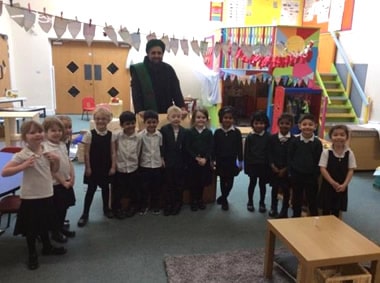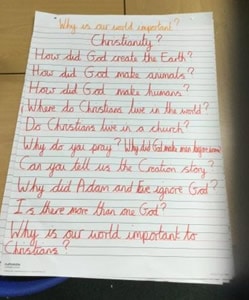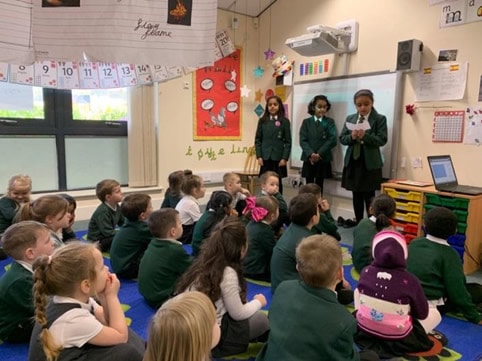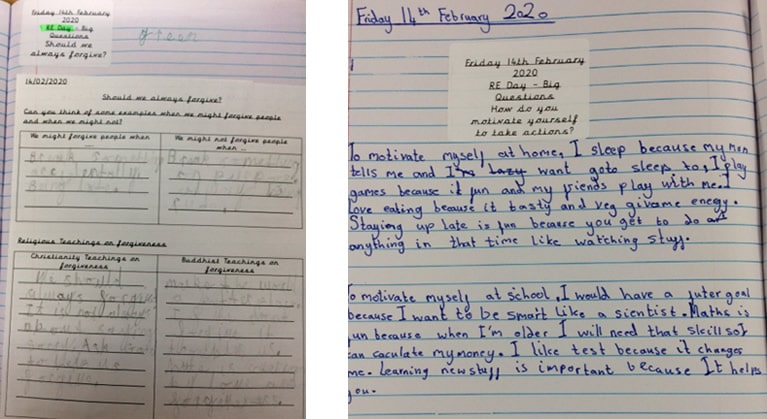Religious Education
Religious Education: Intent, implementation and Impact
Intent:
At Dashwood Banbury Academy we want to create respectful, well – informed and self – confident members of the community. In our increasingly multi – cultural world, we are aware of and exposed to a range of religious experiences and practices of the people around us. With this in mind, we need our pupils to be conscious members of the community in an ever diverse world. Therefore, our two whole school threads are:
- To evaluate the impact religions have on their lives and the lives of others
- ii) To understand how religions have shaped history and culture
These threads are intertwined throughout every key question, so that pupils are able to understand specific religious practices or beliefs in order to reflect on and build their own beliefs. We aspire to develop a range of skills and knowledge which the children can then transfer in other areas of the curriculum as well as the outside world.
We want our children to respect and acknowledge the religious beliefs, morals, values and practices of the overarching religions of; Christianity, Islam, Hinduism, Buddhism, Sikhism, Judaism and Humanism. In turn, we believe this will give them the opportunity to develop their own morals and attitudes to everyday life, creating and nurturing well – rounded members of the community.
Implementation:
 We have an all-inclusive Religious Education curriculum that has a clear progression of knowledge and skills. Religious Education will be implemented through the focuses of; learning about religion and learning from religion by:
We have an all-inclusive Religious Education curriculum that has a clear progression of knowledge and skills. Religious Education will be implemented through the focuses of; learning about religion and learning from religion by:
- Intertwining aspects throughout each year group, including; Me and others – Identity & experience, Ideas of God – Beliefs & Teachings, Stories – Meaning & Purpose, Celebrations – Practices & Lifestyles, Places & Symbols – Expression & Language and Big Questions – Value & Commitment
- A sequence of lessons being taught each term with a different key question. For example, Year 1 focuses on the question ‘How do Christians celebrate Easter?’ in Term 4 and then ‘Why are symbols important?’ in Term 5. These well sequenced focus questions throughout the year enable the children to build upon their knowledge and apply it.
- Each Year group also has particular Religions to focus on to ensure that by the end of their Dashwood journey, the children have a comprehensive understanding of the overarching religions in society. For Example, Year 2 children focus on Christianity & Hinduism and Year 4 focus on Christianity, Islam & Judaism.
 Years 1 – 6 get the opportunity to be part of RE Day. This day consists of children being able to; share and discuss their religious practices and views with their peers, and having visitors for their religions of focus.
Years 1 – 6 get the opportunity to be part of RE Day. This day consists of children being able to; share and discuss their religious practices and views with their peers, and having visitors for their religions of focus.- Years 1 – 6 also get the opportunity to have local visitors of a variety of religions to discuss and ask questions about their practices and views on topical questions.
- Throughout the year, we also have members of religious communities come in to take assemblies when there is a particular religious celebration coming up, for example Reverend Sue at Christmas.
- Nursery and Reception also have visits from older children in the school, to ask them questions about their religious beliefs and holidays.
- Year 6, also get the opportunity to work closely with the mosque over the course of the year, which helps them to understand one of the religious communities within our local area.

Intended Impact:
- For children to enjoy all aspects of the Religious Education curriculum.
- Information will be gathered via pupil and staff voices every year to continue to adapt the curriculum to ensure both staff and pupils are engaged each year.
- Assemblies will ensure that the children have awareness of religious celebrations happening within the community.
- To educate children about having the right balance between following their beliefs and respecting beliefs of other people around them.
- Outcomes will show a range of different presentation styles e.g. posters, comparative writing
Progress will be assessed through outcomes of focus questions and a formative assessment will be given 3 x a year in our data collection points.
Religious Education Knowledge and Skills


